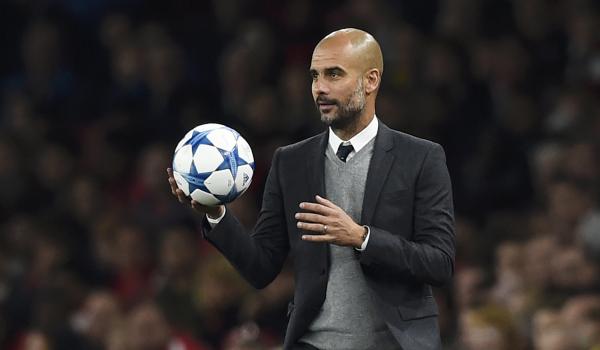There was no sign of Lionel Messi’s mate. The first time he met Sergio Agüero, they were teenagers, brought together in the Netherlands more than a decade ago. Sitting at a table in a dining room, Agüero looked at the kid opposite him, no idea who he was. “What’s your name?” he asked. The reply was delivered quietly: “Lionel.” Lionel would become his room-mate and soon best friend; unknown he might have been but he would also become the best player in the world. Theirs was another of the many relationships renewed here: Claudio Bravo and Marc-André ter Stegen, Nolito and Luis Enrique, Pep Guardiola and all of them. Sergio Agüero and Lionel Messi.
Yet when Messi strolled out, he saw only one member of that Argentina Under-20 team: Pablo Zabaleta. Agüero had been left out. His absence defined the way the game would be played; Messi’s presence decided it. Tactically this was fascinating, contrasting styles within broadly shared philosophies, but talent transcended all – talent and mistakes: a slip, a red card, a ball given away. After this 4-0 defeat Guardiola’s decisions will be debated fiercely.
The first time he came home, with Bayern Munich, Messi scored twice. This time it was three. He had got them all before Agüero even appeared, with 11 minutes left, the game over. Soon afterwards a wonderful run drew the penalty which Neymar had saved by Willy Caballero. Neymar made up for it a moment later. Guardiola stood and watched, with much to chew over.
The news had filtered through an hour or so before kick-off. Agüero had been left out – the question was why. Was he injured? The Catalans had a different view: this was a very Pep thing to do. This, after all, is the manager who said his dream was to have 100% of the possession, a team made up entirely of midfielders. One of his most tactically emblematic games was the World Club Cup final in 2011: that day Barcelona hammered Santos 4-0 with a formation that was essentially 4-6-0 but no less attacking for it. Control was everything.
“Midfielders are intelligent players who have to think about the team as a whole: they’re selfless players who understand the game better than anyone,” Guardiola once said. Eventually it was confirmed. Talking to the television just before the game, he admitted the decision was tactical. Guardiola wanted as many men in the midfield as possible; a midfield that would be pushed high, seeking where possible to asphyxiate their opponents. That meant a front line of three with Nolito and Raheem Sterling on the wings, and Kevin De Bruyne in the middle.
Nor was it just the striker, or lack thereof. When City had the ball, which was often, Zabaleta became a midfielder too – not pushed up, as full-backs regularly are, but pushed in, more Philipp Lahm than Dani Alves, positioning himself alongside Fernandinho so that the fluid formation looked, at times, like a 3-2-3-2 or even a 3-3-4. Together City pressed high. Maybe they had been encouraged by the way that Ter Stegen had given away two goals against Celta Vigo recently.
That is another thing the clubs share: a debate around the goalkeeper playing the ball out but a determination for him to keep doing so. That argument will not subside, in Manchester at least, after Bravo was sent off, yet there was a message too in the way the Camp Nou chanted his name and applauded him from the field, grateful – and not just for the error. Barcelona were rewarded for pressuring there. City’s plan involved pressing too, forcing Barcelona to play from deep, sometimes even to go longer.
Forcing? Encouraging, perhaps? And that is the risk against this Barcelona, the tactical tweak that some believe makes them an even better side than they were before, Luis Enrique giving them a variety that Guardiola did not, winning a treble in his first season, like Pep, and a double in his second.
His is a team adept at riding the first wave of pressure, playing short through it or long beyond it; it is also one that has embraced the counter-attack as never before. Neymar and Luis Suárez allow them to do so to great effect and even Messi was turning the ball forward swiftly, and first time early on. More importantly, of course, he did what he does: he got his 14th, 15th and 16th goals in 15 games against English clubs, all three impeccably taken.
Luis Enrique and Guardiola have shared a lot, the Barcelona manager said. Most of all they share an ideal. That, at least, was the message before this game. “I can’t imagine anything better,” Luis Enrique had said. The suggestion was they would play in similar ways but they did not, not exactly. The suspicion was that Guardiola was more of a purist. Luis Enrique insisted possession would be fundamental but in its relative absence there might be incision. And there was.
City had their share of the ball and their chances too – they had more shots than the home side until near the end, Ter Stegen making a couple of sharp saves – but they did not have Agüero and Barcelona did have his mate.
“The big difference between Barcelona and Manchester City has a name and a surname: Leo Messi,” former Barça defender Ronald Koeman had warned. Asked what the plan was to stop him, Guardiola had laughed. “I don’t know,” he said.
The Guardian
